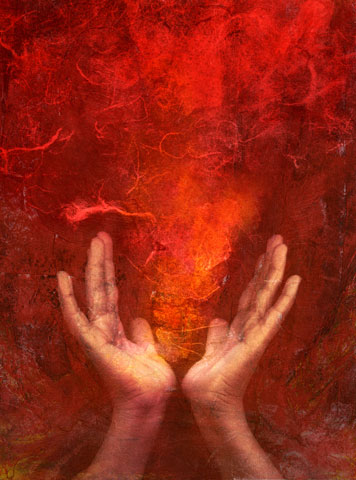
(Dreamstime)
 SACRED FIRE: A VISION FOR A DEEPER HUMAN AND CHRISTIAN MATURITY
SACRED FIRE: A VISION FOR A DEEPER HUMAN AND CHRISTIAN MATURITY
By Ronald Rolheiser
Published by Image, $25
In 1999, Oblate Fr. Ronald Rolheiser published The Holy Longing: The Search for a Christian Spirituality. It was an author's dream, selling some 250,000 copies and establishing Rolheiser as a beloved spiritual writer for Christians of every stripe.
Holy Longing explored the first stage of Christian discipleship and Sacred Fire: A Vision for a Deeper Human and Christian Maturity, its sequel, carries discipleship into a second adult stage. As Rolheiser quips, if Holy Longing is Discipleship 101, then Sacred Fire is the graduate course, 201. Although this "graduate course" looks back to the first stage of "essential discipleship" and forward to "radical discipleship," its focus is on "mature discipleship," the struggle to give one's life away in generative activity.
The book's subtitle reveals the author's aim: to propose a vision for a deeper human and Christian maturity. In clear and accessible language, Rolheiser examines life's journey as revealed both by the human sciences and Scripture and the rich Christian tradition. It is his effort to see parallels between these two sources and their implications for discipleship that make the book stimulating.
Rolheiser's defining premise is that discipleship, like life itself, has stages, each with its own challenges and opportunities. "Essential discipleship," the work of a person up through age 20 or 30, confronts the question "How does one 'get one's life together'?"
"Mature discipleship" is the decades-long effort of giving one's life away to the widest community in what the Hindus call the "householder" stage of life.
The final stage of "radical discipleship" demands a major shift in which one is required to live so that one's death, a part of life, will be a blessing for others.
If the challenge of the first stage of discipleship is how to "not fall apart," then the challenge of the second stage is how to foster discipleship in the hard slough of quotidian adult life. In this stage, the pleasure principle -- the basic source of motivation -- is broken so that one acts more for the good of others than for oneself.
Rolheiser elaborates both the challenges and invitations of this period. There are terrors to be confronted: revenge, loneliness, resentments, joylessness, inability to forgive, and escapism, especially in the form of workaholism. The seven deadly sins are alluring. But Rolheiser helpfully reinterprets them for the contemporary situation. Sloth is seen as evading true responsibility; gluttony is recast to include all addictions; and lust is defined as the absence of purity of intention.
Rolheiser offers insights from Scripture and the mystical tradition, especially from John of the Cross, to challenge these terrors and offer invitations for healing. He re-envisions the Ten Commandants for the long haul of life by focusing on gratitude, empathy, openheartedness, forgiveness, and facing the reality of our lives.
In a particularly insightful chapter, he defines blessing of others as the full flowering of mature discipleship. When one blesses, one "sees and admires" another, speaks well of the person, and gives some part of one's life away so that the person has more life. For Rolheiser, the final stage of maturity is characterized not by martyrdom but by generativity and discipleship, which blesses and gives new life.
Ironically, there are parts of Rolheiser's consideration of mature discipleship, especially the sections on invitations from Scripture and prayer, that are not well integrated into the rest of the volume and might have been abbreviated. Additionally, his language, while lucid, is sometimes cerebral and lacks the vibrancy of the subject matter of holy longing and sacred fire.
The most suggestive -- but most thinly sketched -- chapter is the final one on "radical discipleship," a stage that is dominated by the struggle to give one's death away, to accept the "mystery of passivity," and to leave behind a blessing rather than a curse. Although this final stage of discipleship is not fully developed, Rolheiser promises that it will be the topic of a subsequent book, which would be a substantial contribution to our death-denying culture.
For now, Sacred Fire prompts reflection on mature discipleship and how to keep the sacred fire fueled in the decades of adult life. The reader is left with the provocative question: How do I give my life away?
[Dana Greene is author of Denise Levertov: A Poet's Life and serves on the board of the Shalem Institute for Spiritual Formation.]


